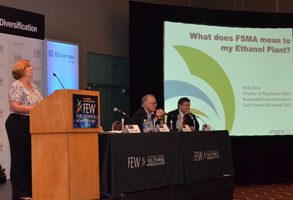 The Food Safety Modernization Act (FSMA) was signed into law in 2011 and this summer the rulemaking for the new act might finally be complete. Because it includes safety of animal food as well as human food, ethanol plants that produce the co-product distillers grains for livestock feed are impacted.
The Food Safety Modernization Act (FSMA) was signed into law in 2011 and this summer the rulemaking for the new act might finally be complete. Because it includes safety of animal food as well as human food, ethanol plants that produce the co-product distillers grains for livestock feed are impacted.
Renewable Fuels Association Director of Regulatory Affairs Kelly Davis talked about what plants will need to do when FSMA becomes final during the 2015 Fuel Ethanol Workshop. “One of the first things in the rule is Current Good Manufacturing Practices,” said Davis, who says that most plants are already ahead of the game in that area. “We have really nice manufacturing facilities, good housekeeping, good quality assurance … a lot of us were gifted what we would call a good manufacturing practice plant.”
The main impact that FSMA will have on ethanol plants is another layer of bureaucracy. “It’s going to be a written plan with constant updating, supervision of the plan, verification of the plan,” said Davis. “It’s going to be similar to other programs like air quality and process safety management – you’re going to write down what you’re going to do, you’re going to do what you wrote down, and you’re going to verify you did it.”
Davis says there were some changes already made in the rule as it has been developed and assuming it is finalized in its current form she thinks ethanol plants will be able to comply within the two year time frame given by the law. “This is an important program and we’re going to provide some guidance to help people comply,” said Davis.
Find out more about FSMA and ethanol plants in this interview. Interview with Kelly Davis, RFA


